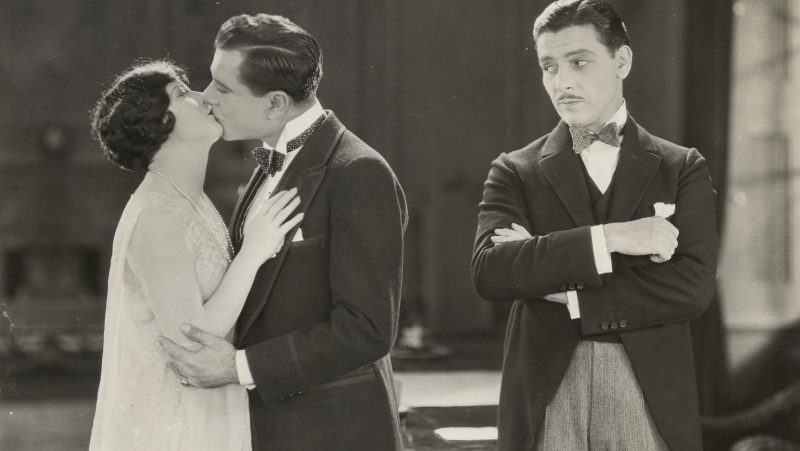Lady Windermere’s Fan with live music by Carl Davis’ trio.
Saturday, October 2nd will be the start of the American women screenwriters retrospective. Also, one-of-a-kind films from Korea
The name Lubitsch means cinema, so inaugurating the Giornate del Cinema Muto at the Teatro Verdi of Pordenone with a film from the renowned German director truly means starting in a grand way. Even more so as this year’s edition will be its 40th and heralds a reopening, albeit in reduced form, with in-person screenings following last year’s online-only pandemic-era edition. Lady Windermere’s Fan, one of Lubitsch’s most beloved masterpieces, will be presented in a sparkling new restoration from New York’s Museum of Modern Art and boasts a live score by Carl Davis. With this screening on Saturday, October 2nd at 9PM, the Festival, running from October 2nd to 9th, will throw open its doors and assume once again its position as an international hub for historians and film lovers.
When the film was released in 1925, Lubitsch had been in America for three years, initially on the invitation of Mary Pickford, and while barely over thirty he was already one of the most established and highest-paid directors in Hollywood. Lady Windermere’s Fan was part of a four-film deal he signed with Warner Brothers, after having fulfilled his contract with Famous Players and before moving on to Paramount. Based on Oscar Wilde’s eponymous play (which would see further adaptations in later years), Lady Windermere’s Fan was immediately hailed a masterpiece by the press and continues to draw accolades to this day: “Not so much a comedy of errors, but rather a drama made up of stares and suspicions, set in a hypocritical society… Lastly, there is no moral lesson, only a bittersweet and fatalistic aftertaste, hidden behind a blacker-than-usual irony.” (Paolo Mereghetti)
Throughout his career, Lubitsch directed the biggest stars of the era, showing respect and affection for them all, as he did for his Lady Windermere’s Fan cast, such as Ronald Colman, who he described in an interview as one of the nicest and finest men he’d ever known, and Irene Rich, who he praised as a performer gifted with a type of humor that perfectly elided with the film’s style.
The musical score by maestro Carl Davis for trio (violin, cello and piano) evokes the Victorian spirit of the late 1800s and the theatrical milieu of London, when the metropolis was bustling with small musical ensembles that freely adapted arrangements composed of arias, marches, sentimental ballads and waltzes.
The screenings begin in the afternoon at 2:30PM, at the teatro Verdi of Pordenone, with the first two films of the retrospective dedicated to American women screenwriters. The new art form that was developing so swiftly more than a century ago could not have existed without the creative energy of so many women, whose natural talent for storytelling left an incalculable mark on the world of cinema. Many of these women writers came from journalism, literature or playwriting backgrounds, and the fast rise of the film industry offered ample work opportunities. Grace Cunard, for example, came from the theater, and episodes from her serial The Purple Mask are being presented during the festival’s kickoff screening. Co-written and co-directed by Cunard, it also features her as the star, playing a high society lady who joins a group of thieves who rob to help the poor: a type of female Robin Hood with a purple cape, a face mask and beret who leaves her mark at the scene of the crime to avoid having any innocent wrongfully accused.
The second female screenwriter from Saturday’s programme is Agnes Christine Johnston, who in the course of her life (1896 – 1978) wrote 84 films, including the 1920 feature An Old Fashioned Boy directed by Jerome Storm. At the time, many saw the film as a danger to the concept of the traditional family because the protagonist, modern-day girl Betty, states she would rather raise dogs than children. The screenwriter was much different from her character, bringing her toddler along to the office, as some publicity photos show. According to Johnston, working made her a better mother and wife, and referring to Betty from An Old Fashioned Boy, she stated that “women have too much creative energy to solely dedicate it to housework. If we only have one task at hand we become nervous.”
Launching at 5:30PM is the first major retrospective in the West dedicated to silent cinema from Korea, a nation whose current movie industry deservedly receives a tremendous amount of attention, including last year’s Oscar for Bong Joon-ho’s Parasite. And yet Korean film from the silent era remains a great unknown. This makes the program from Seoul’s Korean Film Archive of particularly high interest; the afternoon’s program includes footage shot by German missionary Norbert Weber and films made by Elias Burton Holmes, a traveler, documentarist and inventor of the term “travelogue”, remembered with a star on Hollywood Boulevard, who was one of the people training their cameras on the funeral of Korea’s last emperor.
The online programme (on MYmovies) opens with Georg Jacoby’s Jokeren (The Joker, 1928), a sumptuous Danish society drama with a notable international cast, set against Nice’s boisterous Carnival. Piano accompaniment by Stephen Horne.


 Italiano
Italiano
Recent Comments